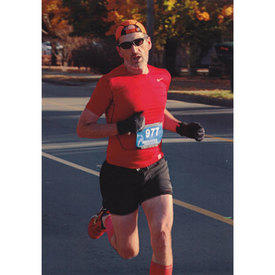Evidence Against Excessive Cardio?
Replies
-
<< Has a super=strong and healthy heart
 Also no knee problems.
Also no knee problems.
Running? Can't stop, won't stop. I've done two marathons and one was the tail-end of an Ironman, so yeah, I'm ok with endurance events. Start training to Boston qualify in September.
Since the point of this thread is to quote a mostly anecdotal study that has already been debunked, I thought I'd throw in my story as well.0 -
<< Has a super=strong and healthy heart
 Also no knee problems.
Also no knee problems.
Running? Can't stop, won't stop. I've done two marathons and one was the tail-end of an Ironman, so yeah, I'm ok with endurance events. Start training to Boston qualify in September.
Since the point of this thread is to quote a mostly anecdotal study that has already been debunked, I thought I'd throw in my story as well.
I guess I missed the debunking.0 -
I have been trying to find the "right" amount of running for several years. I've been in a running group that was trying to convince me I was eating too much protein and lifting too much, and then with the lifting groups telling me that I was eating too many carbs and that running is going to destroy my lifting progress. We all have to find our own approaches but I'm seriously trying to find the sweet spot for the maximum health and appearance benefits.
Same here and I think anything to the extreme is just that, extreme. However, I'm not going to stop running, ever.0 -
We're all going to die of something. May as well be from running.
Anything "excessive" is bad for you. If you trade a food addiction for a running addiction it's still going to get you. Moderate.
I want to die from too much SEX please.... :laugh: :drinker: 0
:drinker: 0 -
I've been thinking about a similar idea. Doing cardio without negatively impacting heavy lifting.
i love cardio, and would spend hours doing it, happily, but now my focus is lifting.
So I'm working on finding the sweet spot for doing enough that it helps with recovery, cardio benefits, and
my mental sanity, while not making my muscles and cns too tired to lift progressively.
Also, if I just go all out now, as I lose weight it will be harder and harder to keep losing, I'll have to keep adding more and more exercise and cutting calories.0 -
I realize my post was in the TL;DR category, but if you read the second part of it, you'll see that I explain how statisticians deal with collinearity among predictor variables in regression analysis.
Your post was excellent. Thanks.0 -
bumpity bump0
-
I realize my post was in the TL;DR category, but if you read the second part of it, you'll see that I explain how statisticians deal with collinearity among predictor variables in regression analysis.
You mean this statement?Runners may in fact be overall eat better, drink less, etc., etc. But they might not be. If you want to know the effect of running independent of the variables which are correlated with running, you have to regress running against these other variables and take the residuals and put them in your model as predictors.
The problem with this statement is that it doesn't work in the real world. It's like saying "if you want to know what factors affect tree height other than trunk diameter," or "if you want to predict race-driving skill independent of reflexes," then do the statistics. You'll find something out, but it may not tell you why trees are tall or why some people are better race car drivers than others, because you're ignoring the most important factors.0 -
How many people run more than thirty miles a week? For those who do, how many have cardiac health as their main reason? I am betting zero. That kind of dedication involves more motivation than that. Even if they started for the cardiac benefits, anyone running 30+ miles a week is doing it because they enjoy it and is probably not going to be concerned with diminishing cardiac returns. Or they are doing it because they enlisted and cardiac health is the least of their concerns.
I know quite a few actually, and they all tout health as one reason among several. The problem, and the responses to this thread enforce this, is that people have aligned themselves in pro-running and anti-running camps, which makes no sense whatsoever. The question is not whether running is enjoyable but how much is too much.0 -
I realize my post was in the TL;DR category, but if you read the second part of it, you'll see that I explain how statisticians deal with collinearity among predictor variables in regression analysis.
You mean this statement?Runners may in fact be overall eat better, drink less, etc., etc. But they might not be. If you want to know the effect of running independent of the variables which are correlated with running, you have to regress running against these other variables and take the residuals and put them in your model as predictors.
The problem with this statement is that it doesn't work in the real world. It's like saying "if you want to know what factors affect tree height other than trunk diameter," or "if you want to predict race-driving skill independent of reflexes," then do the statistics. You'll find something out, but it may not tell you why trees are tall or why some people are better race car drivers than others, because you're ignoring the most important factors.
I give up. Let's talk again after you have worked through a reasonably good intro to statistics book.
[ETA: I guess the word "evidence" in the title of this thread misled me into thinking that people actually wanted to discuss evidence rather than contribute statements such as "I like it!".]0 -
I realize my post was in the TL;DR category, but if you read the second part of it, you'll see that I explain how statisticians deal with collinearity among predictor variables in regression analysis.
Your post was excellent. Thanks.
Thank you 0
0 -
I'll just leave this here for the "experts"
http://www.t-nation.com/free_online_article/most_recent/the_final_nail_in_the_cardio_coffin0 -
Excessive ANYTHING probably isn't a good idea.0
-
I have been trying to find the "right" amount of running for several years. I've been in a running group that was trying to convince me I was eating too much protein and lifting too much, and then with the lifting groups telling me that I was eating too many carbs and that running is going to destroy my lifting progress. We all have to find our own approaches but I'm seriously trying to find the sweet spot for the maximum health and appearance benefits.
^^^ Yup, I'm all for finding a middle ground. I'm a new runner and LOVE it, but don't plan on any marathons. I also want to continue to lift and lift more. Just need to figure out a good happy balance of both.0 -
I LOVE Running....
but screw that marathon crap. I'm all about up to 10K. That's my final.
I do admit however that running becomes an addiction and for some folks, they just....keeep....runnnnaannnngggggg (*forest gump impression*)
Marathons are a bit crazy but definitely worth doing at least once if you love running. You'll get to run all day! If you enjoy 10ks though and you haven't tried a half marathon you should try working up to one. After a full marathon, even though I was well prepared for it...I was in pain. Just the training was pretty rough since its so many miles. But a half? Totally different beast. I feel as good after a half as I do after a 10k. I can go about my day after its done and you'd never know I ran 13.1 miles that morning 8)0 -
I realize my post was in the TL;DR category, but if you read the second part of it, you'll see that I explain how statisticians deal with collinearity among predictor variables in regression analysis.
You mean this statement?Runners may in fact be overall eat better, drink less, etc., etc. But they might not be. If you want to know the effect of running independent of the variables which are correlated with running, you have to regress running against these other variables and take the residuals and put them in your model as predictors.
The problem with this statement is that it doesn't work in the real world. It's like saying "if you want to know what factors affect tree height other than trunk diameter," or "if you want to predict race-driving skill independent of reflexes," then do the statistics. You'll find something out, but it may not tell you why trees are tall or why some people are better race car drivers than others, because you're ignoring the most important factors.
I give up. Let's talk again after you have worked through a reasonably good intro to statistics book.
[ETA: I guess the word "evidence" in the title of this thread misled me into thinking that people actually wanted to discuss evidence rather than contribute statements such as "I like it!".]
As the OP, yes, I want to see real evidence. I very much appreciate your input here. The question has nothing to do with whether one should run, but how much. I'd love to see a study that compared the health of something like long-term 10km runners, half marathoners, marathoners, and ultra-marathoners.0 -
Find what you love and do it.
I love running, cycling, and lifting. I don't worry too much about my macros, but aim for good protein and healthy carbs.
And I don't worry about doing any of these things to the point of the actual "sport" killing me since we all began to die the moment our hearts started beating.
Now, the real concern is getting run over by a car while I'm out running or cycling! :laugh:
ETA: my happy balance is keeping a good schedule that looked something like this before I found cycling:
Mon: easy legs, sprinting intervals for 3-3.5miles.
Tues: easy, light "recovery" run
Wed: good run (pace, distance, time, whatever, just make it count.)
Thurs: chest/back *or* bi's/tri's/shoulders with 1-2miles total jogging as warm/cool.
Fri: rest or family walk
Sat: long exercise (long run, long hike, etc)
Sun: rest or family walk0 -
I would say that any exercise that's excessive will affect the body good in one way, bad in another. But each individual will do what they want to do if that's their niche. Marathon runners will run marathons, bodybuilders will add mass, and Crossfitter's will try to get more fit.
A.C.E. Certified Personal/Group FitnessTrainer
IDEA Fitness member
Kickboxing Certified Instructor
Been in fitness for 30 years and have studied kinesiology and nutrition0 -
I realize my post was in the TL;DR category, but if you read the second part of it, you'll see that I explain how statisticians deal with collinearity among predictor variables in regression analysis.
Your post was excellent. Thanks.
Ditto.
As a scientist, THANK YOU for writing that.0 -
This is an old argument and is basically baloney. The ultimate takedown is here, written by an exercise physiologist for Runner's World:
http://www.runnersworld.com/health/too-much-running-myth-rises-again
Money quote:
"But here, from the actual abstract, is the part they never mention:
"Cox regression was used to quantify the association between running and mortality after adjusting for baseline age, sex, examination year, body mass index, current smoking, heavy alcohol drinking, hypertension, hypercholesterolemia, parental CVD, and levels of other physical activities.
"What this means is that they used statistical methods to effectively “equalize” everyone’s weight, blood pressure, cholesterol, and so on. But this is absurd when you think about it. Why do we think running is good for health? In part because it plays a role in reducing weight, blood pressure, cholesterol, and so on (for more details on how this distorts the results, including evidence from other studies on how these statistical tricks hide real health benefits from much higher amounts of running, see my earlier blog entry). They’re effectively saying, 'If we ignore the known health benefits of greater amounts of aerobic exercise, then greater amounts of aerobic exercise don’t have any health benefits.'"
I think either you or the author of that Runner's World article are misunderstanding what a statistical regression does. A multivariate regression models the variance in the data with respect to the dependent variable (here, mortality rates). Let me break this down.
Suppose you want to know whether mortality rates are affected in any way by running. You happen to know from prior research that "baseline age, sex, examination year, body mass index, current smoking, heavy alcohol drinking, hypertension, hypercholesterolemia, parental CVD, and levels of other physical activities" (the other predictor variables mentioned in the abstract) contribute to mortality. There are two ways to answer your main research question: (1) match for all of these variables in the two populations you are studying, one of which runs and the other does not. This is going to be hard to impossible, given the number and nature of these variables. (2) Find out what the levels of these variables are in the population, and include them as predictors in your model. If, after including them as predictors, marathon running STILL accounts for some variation, then marathon running has an effect on mortality rates.
You might also be a bit confused about what it means when your predictor variables are correlated with each other. Runners may in fact be overall eat better, drink less, etc., etc. But they might not be. If you want to know the effect of running independent of the variables which are correlated with running, you have to regress running against these other variables and take the residuals and put them in your model as predictors.
What the study in question found was this (quote from the abstract):
"Running distances of 0.1-19.9 miles/week, speeds of 6-7 miles/hour, or frequencies of 2-5 days/week were associated with a lower risk of all-cause mortality, whereas higher mileage, faster paces, and more frequent running were not associated with better survival."
What this means in plain English is that the study found no benefits to running more than 20 miles a week. It doesn't mean that there are no benefits, and it certainly does not mean that there are dangers.
The OP was never claiming that there are no benefits to running (He repeated this a few times), and he also stated that the evidence presented in the original article was 'anectodal' at best. He was just sharing an article. Also, you're speaking a different language than most people speak, so if you really, honestly want to have a discussion with normal people about studies, you need to lose the statistical jargon - the average person does not understand what 'regeression' means outside of everyday language so you just come off as a know-it all without actually relaying much information, in my opinion. (Multivariate regression is beyond an introductory statistics class, FYI).
In regards to the article, I agree that whatever fits each individual is best. I feel running for myself is impactful and painful, so I don't do much of it, but I have several friends who run 20-30 miles per week, no problem and love it. However, I have one family member who is now in her fifties, and has done so much running in her life (and still today) that her body is breaking down. She's just replaced her second hip, and still can't wait to heal up so she can run more. She's literally addicted, and probably won't be able to play with her grandkids as they get older because of it. This is an example of TOO much running, the point where the negatives outweigh the positives.0 -
Actually I saw another article on similar research done about a year ago. In that one they said based strictly on statistical info from the research group, that you shouldn't run sustained faster than 5 mph, and shouldn't do more than 25 miles/week. I'm not there yet, so figured I'd do some Googling when I DO get there. ;-)0
-
Thanks all. I'm going to track down the study that's mentioned in the WSJ article and see if I can make sense of the analysis and will report back--after I do some work that I actually get paid for!
 0
0 -
For every article like that, there is an article like this: http://well.blogs.nytimes.com/2013/05/29/is-it-better-to-walk-or-run/
Seems a recent study found that runners are better able to control their weight than walkers, and, as we all know well, excess weight is unhealthy.
So, does this one benefit outweigh the risks of changes in the heart, or vice-versa, or do they balance out.
Also, another recent study found the 50-year-old males who are in better cardiovascular shape have much less risk of developing lung and colon cancer, and are much more likely to survive if they do get it.
Personally, I would like to see the risks of weight lifting investigated. What if you drop it on your toe? Don't tell me it doesn't happen.0 -
I'll still do cardio and strength training. My body responds to that best. I do like distance running every so often though. Some weeks not.0
-
I think it would be impossible to quantify some mileage number that is too much because it is really about stress applied to the body over time. The amount of stress some number of miles applies to an individual is completety dependent on their fitness level primarily and several other things secondarily.
30 miles a week to someone unfit is going to crush them. 30 miles a week to a veteran distance runner is a very easy recovery week. The stress each of these two receives from this identical amount of work is not the same.0 -
For every article like that, there is an article like this: http://well.blogs.nytimes.com/2013/05/29/is-it-better-to-walk-or-run/
Seems a recent study found that runners are better able to control their weight than walkers, and, as we all know well, excess weight is unhealthy.
So, does this one benefit outweigh the risks of changes in the heart, or vice-versa, or do they balance out.
Also, another recent study found the 50-year-old males who are in better cardiovascular shape have much less risk of developing lung and colon cancer, and are much more likely to survive if they do get it.
Personally, I would like to see the risks of weight lifting investigated. What if you drop it on your toe? Don't tell me it doesn't happen.
^ Absolutely irrelevant. The question has nothing to do with running vs. walking and everything to do with how much running is excessive. I'm a runner myself.0 -
Thanks all. I'm going to track down the study that's mentioned in the WSJ article and see if I can make sense of the analysis and will report back--after I do some work that I actually get paid for!

Thank you. Your posts are quite helpful here. I also have an email in to author about this.0 -
Excessive cardio? Well, sure, if you're a bodybuilder. I'm working on getting back in shape for triathlons where cardio is far more important than resistance training. Resistance training is A FOCUS, but not the most important aspect. Lifting heavy won't help me run a marathon. I have to put in the miles on the road to build up my cardiovascular system.
Now, someone who just wants to "get ripped" may be doing too much cardio, and this would be counterproductive to their goals.0 -
Also, you're speaking a different language than most people speak, so if you really, honestly want to have a discussion with normal people about studies, you need to lose the statistical jargon - the average person does not understand what 'regeression' means outside of everyday language so you just come off as a know-it all without actually relaying much information, in my opinion. (Multivariate regression is beyond an introductory statistics class, FYI).
The word "regression" was mentioned in the post I was responding to, so I assumed the poster knew it. If you don't understand the words I use, there's always a dictionary... Or you can just skip what I wrote and move on.0 -
Also, you're speaking a different language than most people speak, so if you really, honestly want to have a discussion with normal people about studies, you need to lose the statistical jargon - the average person does not understand what 'regeression' means outside of everyday language so you just come off as a know-it all without actually relaying much information, in my opinion. (Multivariate regression is beyond an introductory statistics class, FYI).
The word "regression" was mentioned in the post I was responding to, so I assumed the poster knew it. If you don't understand the words I use, there's always a dictionary... Or you can just skip what I wrote and move on.
Again, this is a post about an article that references studies that use regression analysis. The discussion of regression analysis is absolutely on point as my OP had nothing to do with whether anyone liked running, could fit it in with their lifting schedule, were pro-running, anti-running or thought that triathalons were the way to go. It is, however, a question that has quite a bit to do with statistics and my own curiosity about the subject. I am not a scientist or a fitness expert, but I am very interested in these types of studies because they will affect my behavior over the coming years as I age and my goals change.0
This discussion has been closed.
Categories
- All Categories
- 1.4M Health, Wellness and Goals
- 396.9K Introduce Yourself
- 44.2K Getting Started
- 260.9K Health and Weight Loss
- 176.3K Food and Nutrition
- 47.6K Recipes
- 232.8K Fitness and Exercise
- 454 Sleep, Mindfulness and Overall Wellness
- 6.5K Goal: Maintaining Weight
- 8.7K Goal: Gaining Weight and Body Building
- 153.3K Motivation and Support
- 8.3K Challenges
- 1.3K Debate Club
- 96.5K Chit-Chat
- 2.6K Fun and Games
- 4.5K MyFitnessPal Information
- 16 News and Announcements
- 18 MyFitnessPal Academy
- 1.4K Feature Suggestions and Ideas
- 3.1K MyFitnessPal Tech Support Questions

















